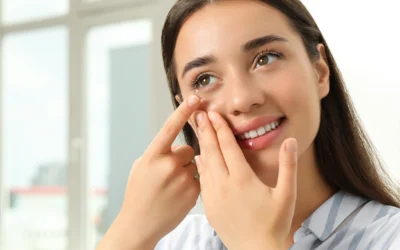If you’ve ever had your vision checked at school, work, or a DMV office, you’ve likely experienced a vision screening. These quick tests are helpful, but they’re not a substitute for a comprehensive eye exam with an optometrist.
At Cedar Hill Eye Care, we often hear the question: “If I passed a vision screening, do I still need an eye exam?” The short answer: yes, you still need to see an eye doctor for an exam. In this blog, we explore the differences between vision screenings and eye exams and explain why a full eye exam is essential for your vision and health.
What is a vision screening?
A vision screening is a basic vision check that typically tests visual acuity, or how clearly you can see letters or objects at a distance. It may be performed by a school nurse, employer, or technician and usually involves reading from an eye chart.
These screenings can detect some obvious vision problems, but are limited in scope. They do not evaluate eye health or identify more subtle issues like eye coordination, focusing ability, or early signs of eye disease.
What is a comprehensive eye exam?
A comprehensive eye exam is a detailed evaluation performed by a licensed optometrist. At Cedar Hill Eye Care, our comprehensive eye exams in Cedar Hill, TX, go beyond just checking how well you can see or updating your prescription for glasses or contact lenses. We assess the health of your eyes and how they function together.
Here’s what a typical comprehensive exam includes:
- Visual acuity testing
- A refraction test to determine your prescription
- Eye muscle and coordination testing
- Examination of the front and back of the eye
- Glaucoma screening (eye pressure test)
- Dilation, when needed, to check the retina and optic nerve
- Evaluation for eye diseases such as cataracts, macular degeneration, or diabetic retinopathy
We also customize exams based on your lifestyle, whether you’re on a screen all day, driving at night, or managing a health condition like diabetes or high blood pressure.
Why you need regular comprehensive eye exams
Even if you have 20/20 vision, your eyes could still be at risk. Many eye diseases, such as glaucoma, develop without noticeable symptoms until significant vision loss occurs. Regular eye exams can catch these issues early when treatment is most effective.
Regular eye exams are even more critical for:
- Children, whose vision problems can affect learning
- Adults over 40, who are at higher risk for age-related eye changes
- Anyone with chronic health conditions
- Contact lens wearers or those experiencing dry eyes, eye strain, or frequent headaches
Schedule your exam today
Proactive care leads to lifelong vision health. If it’s been more than a year since your last eye exam or if you’ve been relying solely on vision screenings, schedule an appointment with our Cedar Hill optometrists today.
You’ll leave with a clearer understanding of your eye health, a personalized prescription if needed, and expert guidance for protecting your vision for years to come. We hope to see you soon!




